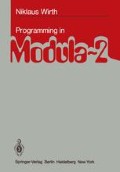Abstract
A formal language is an infinite set of sequences of symbols. The members of this set are called sentences, and in the case of a programming language these sentences are programs. The symbols are taken from a finite set called the vocabulary. Since the set of programs is infinite, it cannot be enumerated, but is instead defined by rules for their composition. Sequences of symbols that are composed according to these rules are said to be syntactically correct programs; the set of rules is the syntax of the language.
Access this chapter
Tax calculation will be finalised at checkout
Purchases are for personal use only
Author information
Authors and Affiliations
Rights and permissions
Copyright information
© 1982 Springer-Verlag Berlin Heidelberg
About this chapter
Cite this chapter
Wirth, N. (1982). A notation to describe the syntax of Modula. In: Programming in Modula-2. Springer, Berlin, Heidelberg. https://doi.org/10.1007/978-3-642-96717-7_4
Download citation
DOI: https://doi.org/10.1007/978-3-642-96717-7_4
Publisher Name: Springer, Berlin, Heidelberg
Print ISBN: 978-3-642-96719-1
Online ISBN: 978-3-642-96717-7
eBook Packages: Springer Book Archive

